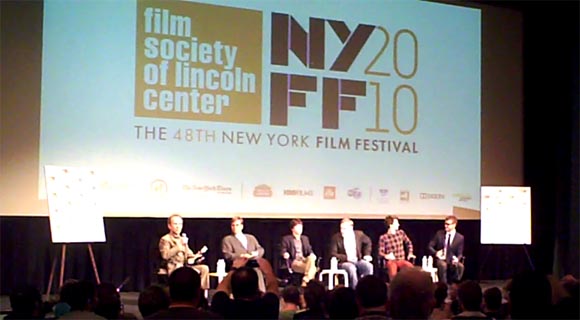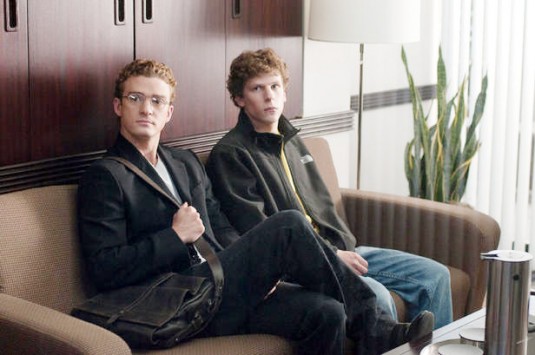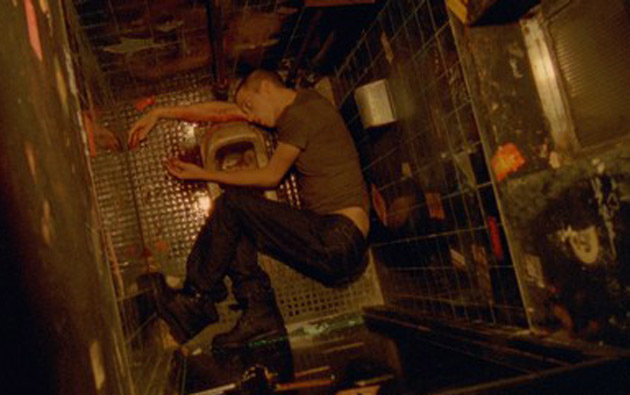[This is the sixth in a series of dispatches relating to the 2010 New York Film Festival.]
“It’s fundamentally the same application for myself. It became clear to me after my first reading of the script that, uh, there was going to be, uh, the version of this person, my character in the film, that he wasn’t sort of the hero, so to speak. And, but, no one sits behind a – you know, I obviously, I’m not, you never play anything sitting behind a laptop, you know, twirling your moustache. I think that, like Jesse said, it doesn’t matter – that’s the beauty of this film to me. Uh, just that you really get to pick, uh, sort of who you side with. And I had a friend who recently screened the film and said to me, I thought it was really telling things, as soon as he walked out, he said, ‘You know, I don’t agree with anyone in this movie. But I don’t disagree with this movie.’ Speaking about all the characters, I think that’s what, what kind of makes the dynamic of these three characters tick. But, uh, I feel like you defend your character. No one believes what they’re doing is wrong in life and, and, and so I feel like….”
The above incoherence, which demands a sentence diagramming army led by a Patton-like grammarian, did not come from Sarah Palin. These words were uttered by Justin Timberlake on Friday morning, who appeared at the Social Network press conference in dorky eyeglasses (prescription or ironic aesthetic?) and didn’t seem to understand that, for once, the event didn’t center around him.
“I feel like you’re looking at me,” said Timberlake after Jesse Eisenberg and Andrew Garfield had offered thoughtful remarks on how they felt empathy for the real-life figures they were playing, “and you want me to add what they said as well. I also have empathy for other human beings, thank you.”
It is safe to say that a man who is set to turn thirty in a few months — indeed, one who has been at the receiving end of several hundred interviews — should have a better ability to speak. But as both the film and the press conference demonstrated, Timberlake is at his best when he is given lines to recite or rudimentary causes to champion.
“I don’t have a personal Facebook page,” said Timberlake later, when a reporter asked all on stage (save moderator Todd McCarthy) about their Facebook presence. “But it is nice to know that, through the world of philanthropy, for instance, that you can send out a message and, for instance, raise money for free health care for kids. I mean, it’s a fantastic thing.”
“I’ve heard of Facebook the way I’ve heard of the carburetor,” answered screenwriter Aaron Sorkin, “but I can’t pop the hood of my car, point to it, and tell you what it does.”
Indeed, the presence of Sorkin at one end of the stage and Timberlake at the other suggested a deliberately arranged spectrum of intellect. Perhaps an inside joke from the fine folks at the Film Society of Lincoln Center. But that speculation wouldn’t be fair to the three men sitting in the middle (much less Todd McCarthy, sitting to Sorkin’s right): respectively, Fincher, Eisenberg, and Garfield.
On playing Facebook co-founder Eduardo Saverin, Garfield noted that Saverin seemed “warm, yet kind of reserved.” There was very little documentation to go on, which granted Garfield some wiggle room to invent.
“I had minimal to go from,” said Garfield, “which was actually quite liberating. Even though I did try to find him in a very obtuse and uncommitted way. But it would have been really interesting. Because, of course, if you’re playing someone who really exists, and who is living and breathing somewhere, you kind of feel a massive sense of responsibility to not ruin them on screen. Because we’re all human.”
Eisenberg confessed that he had developed a greater affection for Facebook honcho Mark Zuckerberg while doing press for The Social Network.
“You have no choice,” he explained. “It’s impossible to disagree with a character that you’re portraying. We shot the movie for about five and a half months. And they were very long days. And you’re spending a lot of time working to defend your character’s behavior. So even if the character is acting in a way that hurts other characters, you still have to understand and ultimately sympathize with that character. It’s impossible to play it any other way.”
Sorkin stated that he didn’t think his script was about Facebook, pointing out that he “thought it was a movie that has themes as old as storytelling itself.” He then compared his work to Chayefsky, Shakespeare, and Aeschylus, pointing out that he hoped the deal with friendship, loyalty, and class – the same themes that these masters did. “Luckily for me, none of these people were available. So I got to write about it.”
Fincher viewed The Social Network as an opportunity to dial his pyrotechnic style down.
“There’s no problem in sublimating your desire to show off if what you’re presenting is something that you think is going to take,” said Fincher. “I mean, originally, the script began. It was in black. And you hear the voices over the black. And I kind of wondered, well, why don’t we just see the Columbia logo and start hearing them then? And hear the jukebox and hear all the people talking and let people know, ‘Pin your ears back, man. You got to pay attention.’ Because if we can start over the trailers of other movies, that’s what I want. And at one point, we talked about the notion of putting the credits over that opening scene. So it was like jukebox, cacophony, people, burger plates, two people talking over each other, and unit production manager. Information overload.”
Technology, for Fincher, represented the double-edged sword of “more options” for today’s filmmakers. He noted that a regatta sequence that appears midway through the film, containing approximately 100 CGI environmental shots, was shot on July 4th. This was less than two months before Fincher needed to have the movie locked for prints.
“The way we make movies has changed radically in the last ten years,” said Fincher. “I mean, I’m able to be in two or three different places at once. I have video tests of rehearsals that are happening in Uupsala right now that are being downloaded so that I can look at them when I go back to the hotel room. So that I can say, ‘This is how I want my parade float to appear on Sunday morning.’ I mean, obviously, that’s a great thing.”
Sorkin stated that he and producer Scott Rudin aggressively courted Facebook in an attempt to secure Zuckerberg’s cooperation on the film.
“Mark ended up doing exactly what I would have done,” said Sorkin, “which was decline. We also told him at the time that, whether they participated or not, we would show them the script when the script was done. And we would welcome any notes that they had. So we did give them the script. And their notes largely had to do with hacking. That there was a little bit of hacking terminology that I’d gotten wrong unsurprisingly. I know that there was a rumor a day or two ago that Mark had been spotted at a screening. I doubt it.”
Fincher was later asked about whether anything was sensationalized or sexed up for the movie. He gave the floor to Sorkin, who replied, “None.”
“I’m not going to sell any tickets by making this statement,” said Sorkin, “but I have to tell you that there is less sex in this movie than there is any two minutes of Gossip Girl. Nothing in the movie was invented for the sake of Hollywoodizing it or sensationalizing it. There are, as I explained, because of the three different versions of the story that were given not just in the deposition rooms, but there was a lot of first-person research that I did with people who are characters in the movie and people who were close to the event – most of whom were speaking to me on a condition of anonymity. And there were a lot of conflicting takes. So there are going to be a lot of people saying, ‘That’s not true. That didn’t happen.’ Just as they’ve been saying that since 2003. The work that I did was exactly the same as the work that any screenwriter does on any nonfiction film. When Peter Morgan writes The Queen, he’s going from fact to fact to fact. But Peter Morgan wasn’t in Queen Elizabeth’s bedroom when they were talking about their daughter-in-law. Moreover, and more important, people don’t speak in dialogue. Life doesn’t play out in scenes. There’s work that the dramatist does. But nothing was invented. Certainly nothing was sexualized in order to amp up the temperature on the movie.
The conference concluded with a chunky, pipsqueaked hack journalist — in desperate need of a haircut and elocution lessons — asking a question about whether The Social Network represented a “departure” for Fincher.
“Because it doesn’t involve somebody aging backwards or because it doesn’t involve serial killers?” replied Fincher, who offered a look as if he had just learned of a last minute dental appointment set for the next morning.
The hack journalist foolishly continued with his inane inquiry.
Fincher sighed. Then he said, “You know, I’d like to give it a lot of really deep thought, but I probably won’t.” He politely presented the hack journalist with the boilerplate answer he so desperately coveted. Then the conference came to a close.




